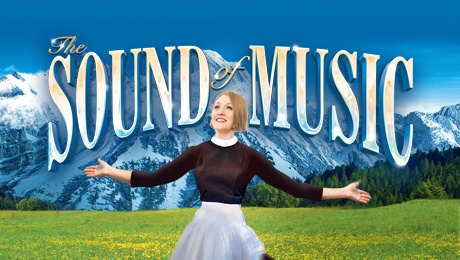@ Edinburgh Playhouse, until Sat 9 Jan 2016
The latest touring production of Rodgers and Hammerstein’s The Sound of Music impresses visually from its first moments, as the curtain rises upon an epically-scaled (and hauntingly-lit) interior of Salzburg’s Nonnberg Abbey. The Nazis are as yet a rumbling background threat, but the nuns have a problem that is closer to home – specifically, a problem named Maria. The young novice nun has a habit of breaking the Abbey’s rules, particularly whenever the rules involve not being allowed to sing. However, the Mother Abbess (the vocally powerful Jan Hartley), has a suggestion, if not an outright solution, and Maria (Lucy O’Byrne) is packed off to the mansion of the widowed Captain Von Trapp (Gray O’Brien), to be governess to his seven children.
Thanks to Julie Andrews, and the phenomenal success of the 1965 film version of the show, O’Byrne’s Maria has awfully big vocal chords to live up to, but live up to them she does. This is a role that could easily be irritating and saccharine in less capable hands, but between O’Byrne’s competent acting, flawless singing, and her natural warmth and effortless stage presence, she is able to carry the show with ease. Backed up by equally professional performances from Annie Horn as Liesl (the eldest Von Trapp child), Kane Verrall as Rolf (her young Nazi love interest), and the ensemble – largely composed of nuns and small (not too-precocious) children – the production once again impresses, but Maria’s aren’t the only big shoes that must be filled. As the celluloid Captain Von Trapp, Christopher Plummer made the role his own, and neither the comparisons with him, nor with his fellow cast members, help O’Brien much. During the first Act, his singing is a little strained, and he seems to be uncomfortable with Martin Connor’s direction, which is admittedly frequently clunky, but O’Brien is nevertheless a warm and appealing actor who comes into his own in the second Act, with a pleasant performance of Edelweiss, and some genuinely touching scenes with Maria and the children.
As with the direction, the choreography is sometimes hammy and the cogs all too visible, though the cast rallies well and there are enough clever touches to render this forgivable. The bigger flaws are inherent in the book itself. While the show is relentlessly cheerful, it weaves threads of danger throughout so that its infinitely darker, more nuanced climax seems organic. However, structural and dialogue “changes” jar with an audience brought up on the film version, which many in the audience know by heart. Two satirical songs, which were written for the original stage production, but wisely left out of the film, feature the secondary characters Max Detweiler (Duncan Smith) and Elsa Shraeder (Isla Carter). While well-performed, and unquestionably more grown-up in theme than the rest of the score, they don’t feel like they belong here, taking the focus away from the show’s heart.
The biggest “crime”, however, is the loss of the scene in which the Captain sings Edelweiss to Maria and the children. In the film, it is a subtle but pivotal character point, which moves forward both the widower’s relationship with his children, and his relationship with their governess. In the stage production, the blossoming of romance between the two leads seems rushed, and the rendition of Edelweiss near the end loses some of its emotive power, not having an earlier rendition to hark back to. It is hardly fair to criticise a show for not living up to improvements superimposed by a film, but nevertheless these reversions to Howard Lindsay and Russel Crouse’s original book are keenly felt.
Nevertheless, The Sound of Music won the 1960 Best Musical Tony Award for a reason. The script is clever and its dialogue sharp – a shout-out here to wee Brigitta and her comedic one-liners – but, above all, the score is superlative. Granted, there are a few earworms that will cause vast swathes of the audience to go home each night singing lustily (whether they like it or not), but isn’t that, after all, the sign of a good musical?
